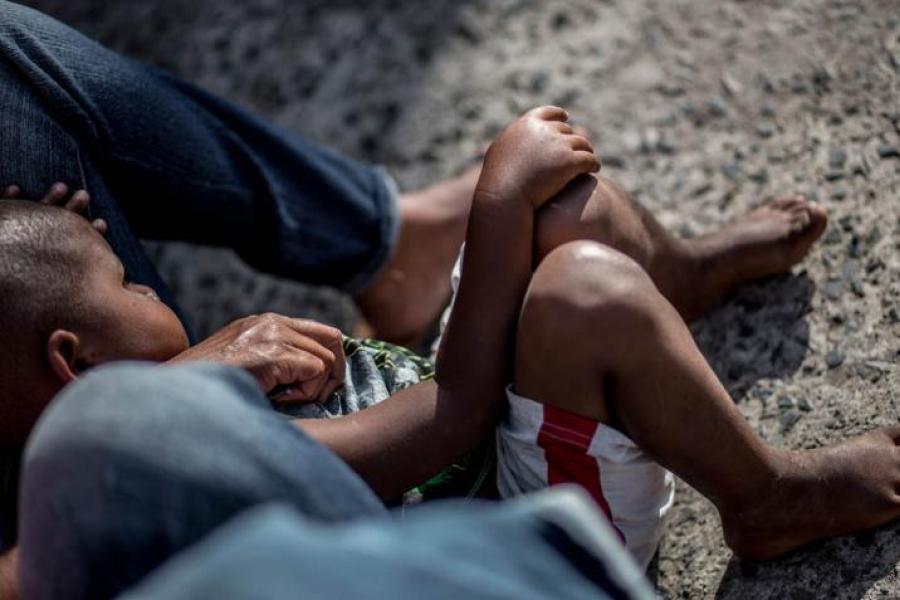Number of COVID-19 orphans nears 150,000 in South Africa
05 September 2022

UNICEF South Africa calls for a whole of society response to protect, nurture and care for the most vulnerable children.
PRETORIA, 05 September 2022 – COVID-19 associated deaths have left nearly 150,000 children as orphans, according to latest data modelling from Imperial College London, as part of the Global Reference Group for Children Affected by COVID-19: Joint Estimates and Action. That number rises to 207,400 when including children who have lost their primary or secondary caregiver, such as a grandparent.
The tragic figures reiterate the importance of a holistic and child centred response to the broad ranging impact of COVID-19 on childhood, particularly to protect and support children who have been left without one or both parents, or another primary or secondary caregiver.
“Children’s lives have been devastated by the pandemic in so many ways and for those who have lost parents or caregivers the deep scars will last forever,” said Muriel Mafico, UNICEF South Africa, Deputy Representative. “But with love and care, access to social protection, education and opportunities for growth and development, these children can
recover, thrive and realize their full potential,” added Mafico.
The loss of parental support and loved ones during childhood can have a long-lasting impact on mental and physical health. These children are more likely to experience violence and abuse and be neglected and exploited.
“A nurturing, protective and stable family environment at home is vital for positive childhood experiences, yet for orphaned children this is too often a distant dream,” said Mafico.
Efforts to scale up and strengthen the capacity of family-based care and social protection systems are critical to enhance family resilience and help to prevent any recourse to institutional care.
UNICEF South Africa is working with partners to protect every child’s right to live and grow up in an environment that supports their physical, psychological, social and emotional development. This includes through:
- Scaling up access to interventions such as Safe Parks that provide a protective and caring environment in which children are nurtured by professionals and caregivers, where they can play, receive learning support, counselling and health services.
- Engaging caregivers and households in early childhood development, from learning through play to positive parenting techniques, including building knowledge and skills about how to best nurture children.
- Building the capacity of teachers to best support the psychosocial needs of the most vulnerable children in the school environment and in-turn ensure school retention.
- Building the capacity of staff in primary health care facilities and community health workers to provide integrated services to children that best protect their mental and physical health.
- Increasing uptake of the Child Support Grant to ensure that the most vulnerable households receive help alleviate some of the stresses of everyday life, whilst closing the exclusion rate of 2.2 million eligible children.
- Providing the most vulnerable youth with access to skills building opportunities, as well as work and entrepreneurial mentorships and opportunities.
-
The tragic and increasing number of COVID-19 orphans is also a reminder that COVID-19 is not over, and the virus has led to the deaths of more than 1-million people globally in 2022 alone, according to WHO figures.
Vaccination continues to be the most effective way to prevent serious illness or death. In June this year, The Lancet estimated that 19.8 million lives were saved during the first year of COVID-19 vaccinations, December 2020 to December 2021.
UNICEF South Africa continues its COVID-19 response with the National and Provincial Departments of Health to help build further momentum towards the 70% coverage target of the adult population by the end of 2022. This includes strengthening vaccine cold chain management and systems, as well as communication and community engagement work to bolster COVID-19 vaccine coverage, as well as routine childhood immunization.
UNICEF South Africa is extremely grateful for the support received towards the COVID-19 vaccine response from donors including the Government of Germany’s Federal Foreign Office, the Government of Japan and the Cotton On Foundation.
Notes to Editors:
Imperial College London provides a regularly updated chart on estimates of orphanhood in South Africa and across the world and is available here
The Global Reference Group for Children Affected by COVID-19 and Crisis is hosted by and linked to the World Health Organisation to develop up to date evidence of the numbers of children affected by COVID-19 associated orphanhood, and to support policy and programming that can mitigate the impacts of COVID-19 on children and adolescents.
The Lancet study, Global impact of the first year of COVID-19 vaccination: a mathematical modelling study is available here.
COVID-19 associated orphans are defined as being under age 18 and having lost one or both parents.









